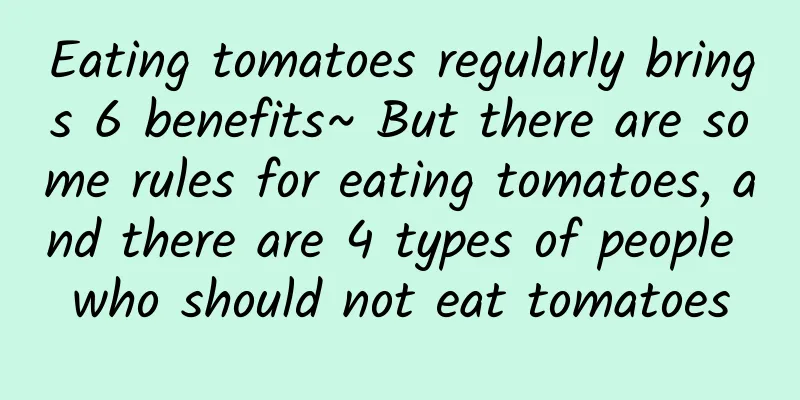Eating tomatoes regularly brings 6 benefits~ But there are some rules for eating tomatoes, and there are 4 types of people who should not eat tomatoes

|
Tomato is one of the most popular vegetables. It is refreshing and delicious when eaten raw, and can be made into various delicacies when cooked, such as scrambled eggs with tomatoes, beef brisket stewed with tomatoes, tomato pasta...all of them are mouth-watering~ Tomatoes are not only delicious, but there are also many studies on their nutritional value. Today, Coco will take you to learn more about them. 1. Eat tomatoes regularly, and you will get 6 benefits Tomatoes are rich in nutrients such as vitamin C, carotene, and B vitamins, and their content is 2 to 4 times higher than that of apples, pears, bananas, and grapes. Their mineral content can also account for 0.6% of the total weight, mainly calcium and phosphorus, followed by zinc and iron. But the most boastful thing is the lycopene it contains. Its antioxidant capacity is 3.2 times that of beta-carotene and 100 times that of vitamin E! 1. May reduce the risk of certain cancers. Lycopene not only helps to excrete toxins and other harmful substances in the body and reduce damage to cells, but also resists harmful substances that transform normal cells into cancer cells. A study by Harvard University in the United States found that people who eat 10 servings of tomatoes or tomato products per week have a 45% lower risk of prostate cancer than those who eat less than 2 servings of tomato products; women with high levels of lycopene in their bodies also have a lower probability of developing cervical cancer. A large-scale study in Singapore confirmed that the risk of primary liver cancer was 37% lower in the 1/4 of people who ate the most tomatoes, compared with the 1/4 of people who ate the least tomatoes. Other studies have found that a reasonable intake of lycopene in the diet can effectively prevent digestive tract cancers such as esophageal cancer, colon cancer, and gastric cancer. 2. Protect blood vessels Studies have found that eating tomatoes every day is beneficial for lowering serum lipid peroxides and LDL oxidation levels. The antioxidants in tomatoes can help reduce the risk of cardiovascular disease. In addition, eating tomatoes and tomato-related products regularly can also help reduce inflammation and reduce the chance of blood clots. 3. Protect your skin Lycopene is known as "natural sunscreen" because it can fight against damage caused by ultraviolet rays and is beneficial to consume in all seasons. 4. Promotes Brain Health Lycopene can improve neurological function, help maintain memory and cognitive abilities, and delay the onset and progression of Alzheimer's disease. 5. Protect your eyes Lycopene's powerful antioxidant function can protect the eyes from oxidative stress, help prevent or delay cataracts, and slow the progression of macular degeneration. 6. Sober Up Lycopene is a powerful free radical "scavenger", and alcohol produces a large number of free radicals during metabolism. Therefore, eating some tomatoes or their nutrients before drinking can help reduce the damage of alcohol to the liver; eating them after drinking can help relieve symptoms such as headaches and vomiting. Note: The academic community currently believes that a person can obtain health benefits by consuming 5 to 10 mg of lycopene per day. However, based on the content of 3 mg/100 g, you need to eat 200 g of tomato pulp to reach the daily intake of 6 mg. 2 There are four questions about eating tomatoes No more worries after reading 1Which is better, raw or cooked? In fact, from a nutritional point of view, whether eating tomatoes raw or cooked, each has its own advantages: ①Eat raw: Vitamins are more complete and more helpful for weight loss Eating tomatoes directly can preserve nutrients such as vitamin C, potassium, dietary fiber more completely, and they will not be lost due to high-temperature cooking. In addition, eating raw tomatoes makes you feel fuller, and since they are not cooked with oil, salt and other ingredients, the calorie intake is lower, which is more helpful for weight loss. ② Cooked: better absorption Eating cooked tomatoes is not only easier to digest, but also after heating, the fat-soluble lycopene is more easily absorbed by the human body and has a stronger antioxidant effect. An experiment showed that the intake of heated and processed tomato products increased the lycopene content in plasma by 3 times. 2 Big or small, which one is better? First of all, it should be confirmed that no matter whether it is a big tomato or a small tomato, they all have the benefits mentioned above. However, in some aspects, they do have their own advantages: ①Small tomatoes, more vitamins The folic acid content of small tomatoes is about 10 times that of large tomatoes, and the vitamin C and E content is more than twice that of large tomatoes. ②Large tomatoes, lower calories The calories of large tomatoes are slightly lower than those of small tomatoes. Therefore, from the perspective of weight loss, eating large tomatoes is more suitable. Tip: Cherry tomatoes are not genetically modified fruits, they are just grown in a different way. 3. Red, orange, yellow, which one is better? There are many types of tomatoes, and the nutritional content of tomatoes of different colors is also different, each with its own focus: ① Red tomatoes: Rich in lycopene. As a super antioxidant, lycopene can protect human cells from damage by free radicals and enhance the function of the immune system. ②Orange tomatoes: Rich in tocopherol, it is an antioxidant that helps prevent skin diseases such as eczema and psoriasis. ③Yellow tomatoes: They usually contain high levels of polyphenol compounds, which help lower cholesterol and blood pressure. 4Should it be stored in the refrigerator? Tomatoes are generally not suitable for refrigeration. After refrigeration, their quality will decline, and their texture and taste will change. If the refrigerator temperature is too low, the flesh of the tomato may become watery and soft, or it may fall apart. In addition, if it is left in the refrigerator for too long, microorganisms such as mold may grow on the surface and black spots may appear, making it unsuitable for consumption. Recommendation: Store at room temperature with the stem facing downward to reduce air entry and delay water loss. 3 Tomatoes are good, but eating them like this If nutrients are lost, you may get poisoned. 1. Don’t eat green tomatoes Green tomatoes are mostly unripe, and such tomatoes may contain a lot of tomatine, which can cause poisoning if eaten too much. Symptoms include nausea, vomiting, salivation, and general weakness and fatigue, and in severe cases, life-threatening. 2. Scrambled eggs with tomatoes are high in calories Most families add oil twice when making scrambled eggs with tomatoes: once when frying the eggs and again when frying the tomatoes. In this way, a pot of scrambled eggs with tomatoes is likely to exceed the daily oil intake. If sugar is added for flavoring during the production process, it will truly be a "high-calorie food"! 3. Ketchup cannot replace tomatoes Ketchup is used to dip French fries, spread on toast, stew tomato soup, etc. However, the sour-tasting ketchup is mostly high in salt and sugar, which is not good for cardiovascular health, so it is best to eat less. 4 4 types of people should not eat too many tomatoes Although tomatoes are good, they are not suitable for everyone to eat. You should control the amount of consumption: 1People with gastroesophageal reflux The two main organic acids present in tomatoes, citric acid and malic acid, can aggravate gastroesophageal reflux disease if eaten frequently or in excess. 2People with renal impairment The U.S. Department of Health and Human Services notes that people with kidney problems should reduce their potassium intake, and tomatoes have high concentrations of potassium. Eating several tomatoes in a row is undoubtedly a burden for patients with chronic renal dysfunction and impaired renal potassium excretion. Therefore, such people should be careful when eating tomatoes. 3People with urinary incontinence and cystitis Sour foods, including fruits, vegetables and beverages, are generally considered to be potential bladder irritants and may increase the risk of urinary incontinence for some sensitive people. Sour tomatoes are no exception. 4People who are taking anticoagulant drugs Tomatoes contain more vitamin K, which can weaken the efficacy of anticoagulant drugs and even cause blood clots. Therefore, the two should not be eaten together. Source: I am a great doctor official account |
<<: Minoxidil was originally intended to treat high blood pressure, but ended up treating hair loss.
>>: How to eat rice cake and what is its meaning?
Recommend
Can I drink yogurt during menstruation?
The nutritional value of yogurt is not higher tha...
What to do for second degree cervical erosion?
We all find it scary to hear about double cervica...
What should I pay attention to during the confinement period?
Confinement is extremely important for girls, and...
How to exercise pelvic muscles after giving birth
Many mothers who have just given birth are worrie...
Why does increased leucorrhea cause backache?
Increased vaginal discharge and lower back pain h...
Eyebrows are close together
A person's facial features are often the firs...
No sex a few days before hysteroscopy
Hysteroscopy is a method of examining female gyne...
What is the standard weight of a 1.62 meter tall girl?
Most women are very concerned about their body sh...
What is the reason for the small gestational sac? Are they playing tricks?
When pregnant women just become pregnant, they mu...
What to do if your period is drifting
If a woman is menstruating, swimming or strenuous...
What are the best ways to slim down your thighs?
There are many female friends around me who think...
What are the symptoms of Bacterial Vaginitis?
Vaginitis is certainly not unfamiliar to many wom...
What does gynecological endocrinology check?
Endocrine is especially important to women, just ...
What causes fishy smell in vaginal discharge?
Leucorrhea with odor is a manifestation of abnorm...
What are multiple cervical cysts?
Some women cannot get pregnant and go to the hosp...









